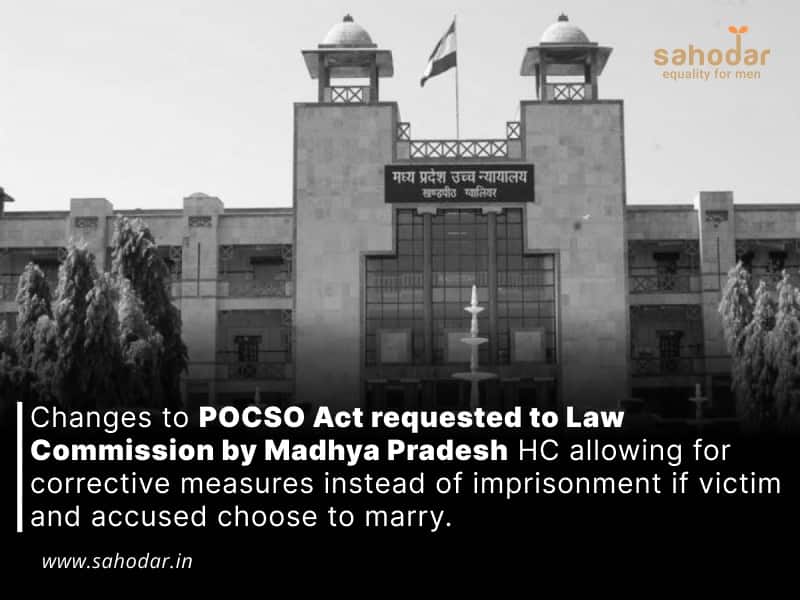During the hearing of a bail application of a POCSO Act accused, the Madhya Pradesh High Court has urged the Law Commission of India to consider recommending changes to the Act. Specifically, the court has requested that the Act be amended to allow Special POCSO Judges to impose corrective measures instead of prison sentences, particularly in cases where the accused and the victim have entered into marriage.
Justice Atul Sreedharan, presiding over a Single Judge Bench, has drawn attention to the fact that the POCSO Act treats ‘Rape’ (without consent) and ‘Statutory Rape’ (with consent but punishable because the victim is under eighteen years old) as the same offense. He noted the predicament faced by Trial Judges in determining the appropriate sentence in such cases. The judge expressed concern that applying the law literally in cases where the accused and victim are married and living as a family with children could result in the husband being convicted for a minimum of ten years under Section 4(1) of the Act or a minimum of twenty years if the wife was under sixteen years old at the time of elopement under Section 4(2), and an additional twenty years for a Section 6 offense. The judge lamented the situation, stating that the courts were obliged to enforce the legislative will, regardless of its flaws, and that good intentions can sometimes lead to unintended negative consequences.
The court made a distinction between ‘rape’ and ‘statutory rape’, stating that rape is universally recognized as a heinous crime and is punishable in all civilized societies. In contrast, statutory rape is considered a malum prohibitum offense, which is not inherently evil but is prohibited by legislation based on current social norms. In cases of statutory rape, the victim’s willingness and consent are irrelevant, even if they were actively involved in the sexual activity, because the victim is under the age of consent, which is eighteen years in India. This is where the problem lies.
The court expressed its opinion that the provisions of the POCSO Act, which deal with cases of penetrative sexual assault, aggravated penetrative sexual assault (rape), sexual assault, aggravated sexual assault, and sexual harassment of a child, are just and appropriate in situations where the offender is an adult and there is no de facto consent. However, the court noted that the POCSO Act does not distinguish between rape and statutory rape, which can lead to the destruction of families in cases where the victim, who is usually on the brink of adulthood, elopes with the accused, gets married, has children, and later the accused is convicted and sentenced to a minimum of ten years of rigorous imprisonment, which may extend up to twenty years.
The Court considered the negative impact of the POCSO Act on marginalized sections of society who are affected by illiteracy and poverty. It found that in certain cases, the Act is causing disruption and devastation to families in rural Madhya Pradesh by sending the sole breadwinner to jail for a minimum of ten years, leaving his wife and children vulnerable to social exploitation. In such cases, where the victim is unemployed, survival options are limited and may include prostitution or crime. The Court expressed concern that the state has no obligation to provide for the basic minimum required for the survivor’s survival. Therefore, the Court opined that the enforcement of the POCSO Act in its present form to such cases is causing gross injustice and recommended the issue to the attention of the Law Commission of India.
The Court made a request to the Law Commission of India to consider potential amendments to the POCSO Act. It suggested that if the victim of statutory rape appears to have given de facto consent despite being below the age of consent, the Special Court should be given the discretion to impose a sentence based on the facts and circumstances of the case, with no minimum sentence required. This sentence could range up to twenty years. Additionally, in cases where the victim is below the age of consent and the relationship has resulted in marriage (with or without children), the Special Court should have the power to impose alternative forms of correction, such as community service, rather than imprisonment.
Source: https://www.livelaw.in/news-updates/pocso-act-teenage-relationship-victim-consent-accused-marry-husband-jail-madhya-pradesh-high-court-law-commission-suggest-amendments-correctional-methods-226168

